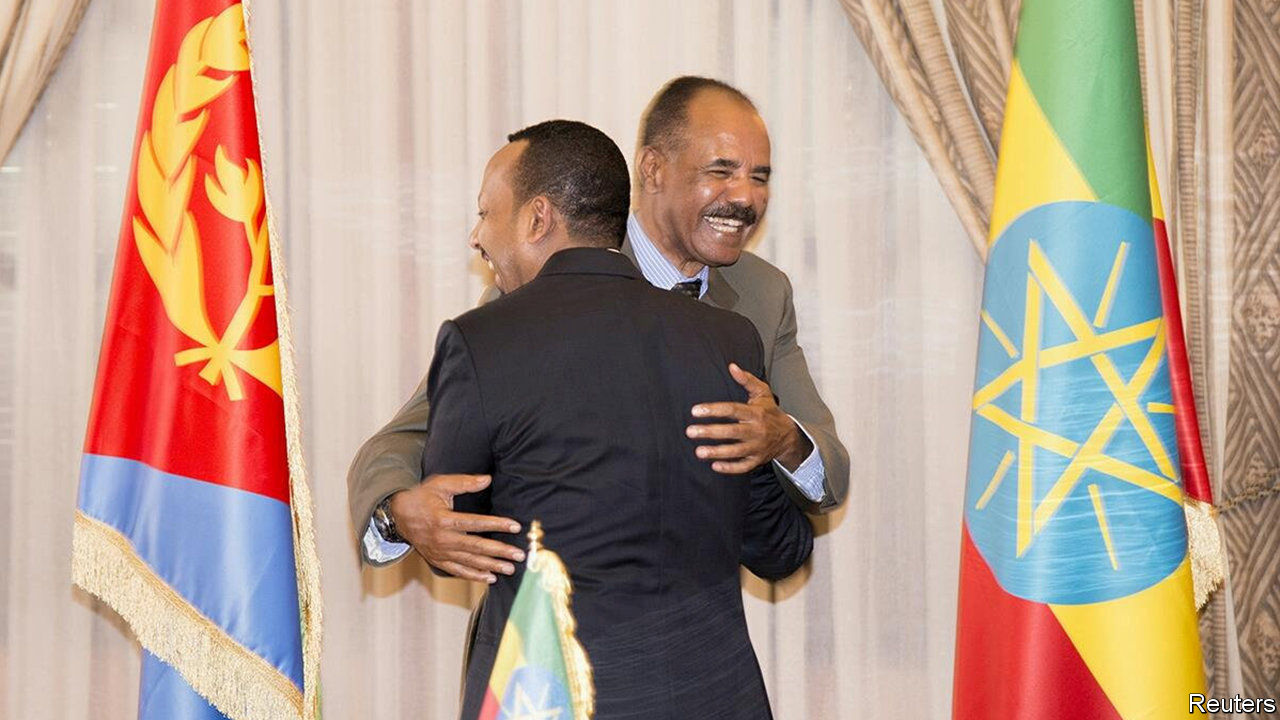International phone calls between the two countries have been restored, meaning friends and families divided by the stand-off can speak for the first time in decades. Soon they will be able to meet in person, as direct flights resume next week. Embassies in both capitals are to reopen. Mr Abiy said his counterpart had agreed to grant access to Eritrea’s ports, a boon for Ethiopia which lost its main route to the sea with the outbreak of war.
Though it won the war, Ethiopia will have to withdraw from occupied territories, at last implementing a peace agreement signed in 2000. It has also submitted a formal request for the lifting of UN sanctions against Eritrea, which were imposed in 2009 as part of an Ethiopia-led containment strategy. (The UN’s secretary-general, António Guterres, said on July 9th that the reasons for sanctions, which included allegedly arming jihadists in neighbouring Somalia, might no longer apply.)
Both stand to gain from peace. After a long war for independence, Eritrea seceded from Ethiopia in 1993, following the toppling of the former Marxist regime and a referendum. Ethiopia was the largest trading partner of the newly independent Eritrea. With the first gunshots, though, centuries of commerce abruptly ceased. Lucrative potash deposits straddling the border have since been neglected. Eritrea’s enormous potential for tourism—a sparkling coast and, in Asmara, one of the continent’s most beautiful cities with a wealth of Art Deco buildings—has been mostly squandered. Renewed ties with its much larger neighbour now offer Eritrea’s ailing economy prospects of revival. Ethiopia has already promised to buy a 20% stake in Eritrea’s national airline.
But peace poses problems for Mr Issaias, who has used the threat posed by Ethiopia to justify his authoritarianism and the maintenance of a huge army. Demobilisation, as well as winding down Eritrea’s controversial national conscription, might prove fatal to his rule. “If the tens of thousands of young national servicemen and women are allowed to go home, what jobs await them?” asks Martin Plaut, the author of “Understanding Eritrea”.
Mr Abiy deserves credit as the architect of the thaw. Most observers were dismissive when the prime minister announced his intention to make peace in his inaugural address in April. His two predecessors—Hailemariam Desalegn, who resigned in February, and Meles Zenawi, who ruled as a strongman from 1995 to 2012—had both said similar things. The difference is Mr Abiy’s age (at 41, the former intelligence officer is from a new generation) and his political background. Though still a member of the Ethiopian People’s Revolutionary Democratic Front (EPRDF), the ethnic coalition which has ruled the country uninterrupted since 1991, Mr Abiy is from its Oromo faction. Over the past three months he has stripped the historically dominant Tigrayan wing, the Tigrayan People’s Liberation Front (TPLF) of much of its power, including over foreign policy. This made it more likely that Mr Issaias, whose enmity with the TPLF dates back several decades, would accept the olive branch.
But Mr Abiy’s triumph might be short-lived. Kjetil Tronvoll of Bjorknes University College notes the achievements so far are “low-hanging fruits”. Trickier will be physical demarcation of the border: last month communities on the Ethiopian side, notably the disputed town of Badme that sparked the conflict in the first place, protested at the prospect of being moved. Mr Tronvoll also cites trade and tariff regimes, currency conversion, as well as mutual security guarantees, as potential roadblocks. In Asmara the two leaders danced together side by side. Expect more opportunities to stumble.






